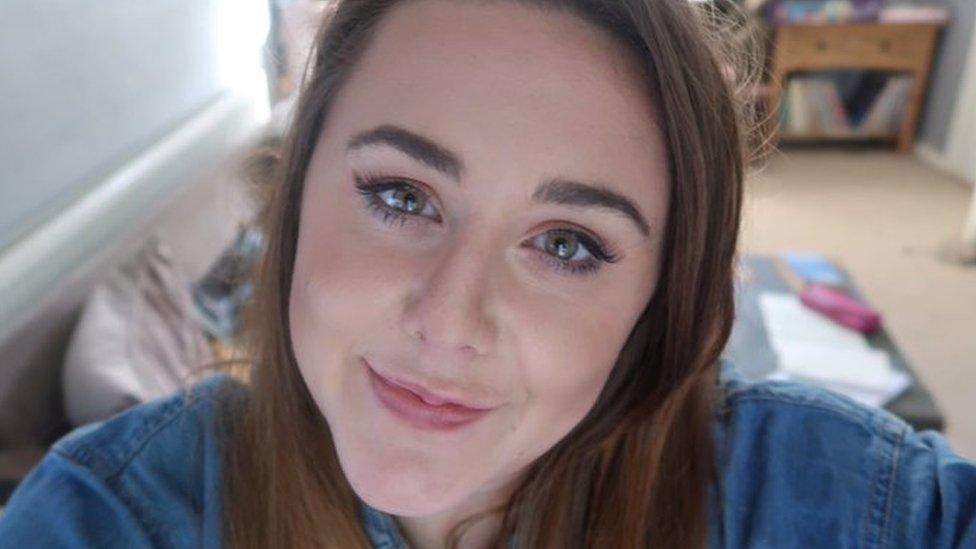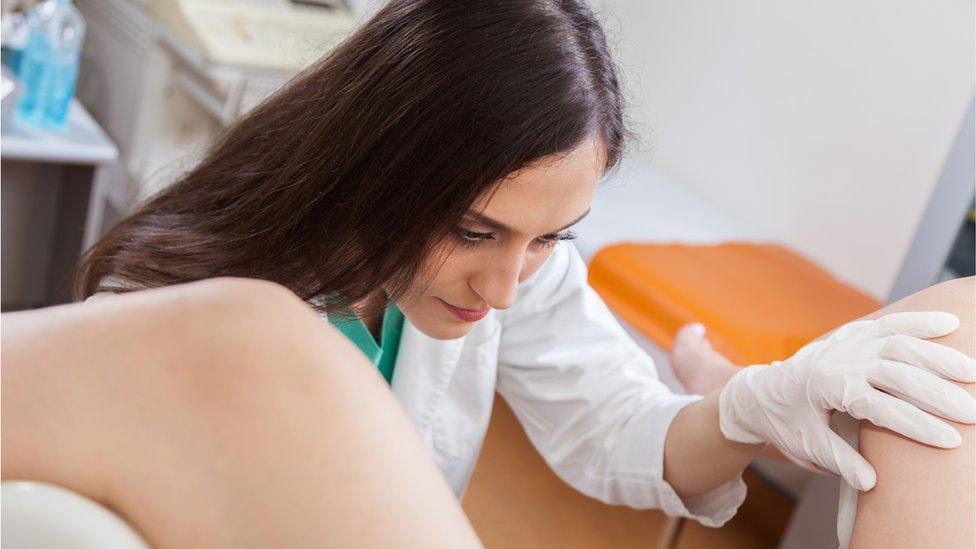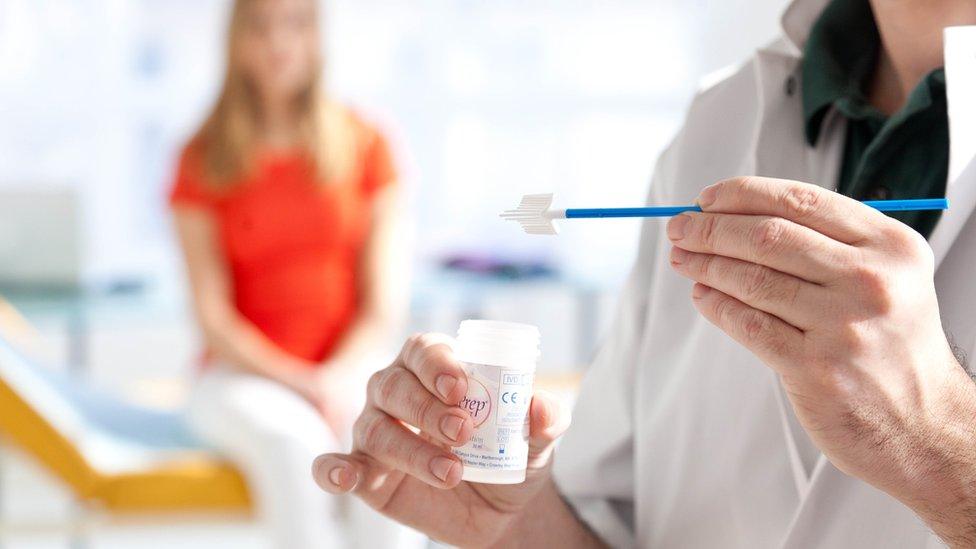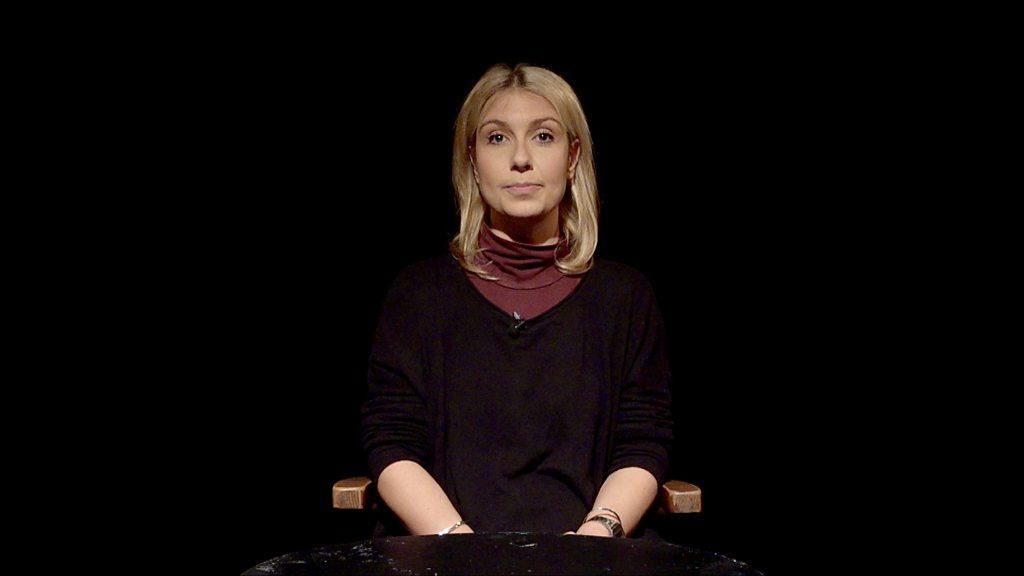How did Twitter help a sexual abuse survivor brave a smear test?
- Published

Anneli Roberts had never had a smear test before
"I just booked my first-ever smear test. It's taken years of building up the courage. I'm 29 years old. I'm a sexual abuse survivor.
"Today something clicked and I managed to book the appointment.
"Group hug?"
With more than 3,000 comments, 1,000 retweets and close to 55,000 "likes", Anneli Roberts soon discovered her request on Twitter for a group hug had led to much more - a huge global conversation full of advice, support and confessions about the test intended to help prevent cervical cancer., external
Anneli, from Caernarfon, says she was shocked by how many people got in touch and how far her original tweet on 5 August spread - three days before the appointment.
Reactions came in from all over the world about why women avoided cervical screenings (smear tests) and also advice about how to make the procedure less worrisome and anxiety-inducing.
"I tend to talk to Twitter a lot. I advocate for mental health, and the peer support on the platform really helps," says Anneli.
"I tweeted about the appointment because I wanted to be held accountable to my followers. I had booked my appointment once before and cancelled it."
She said she was surprised by the reaction as people are often afraid to talk about the subject. "You do think, 'am I the only one struggling?'."
What happens during a smear test?
"There was a lot of good advice which I ended up taking. A lot of women told me to tell the nurse, and I'm not sure I would have considered how important and helpful that would be before I tweeted."
Anneli wrote a more detailed blogpost about her experience, external at the appointment, explaining how she wore a skirt after several people suggested this would help her get through the procedure. She also told the nurse about her history involving intimate sexual abuse and how she was treated afterwards.
She says: "I got messages from a few medical professionals. There were doctors who told me that it had never crossed their minds that women might be avoiding their smear tests - not because of embarrassment, but because there was a lot more going on that stopped them from wanting to be examined."
Allow X content?
This article contains content provided by X. We ask for your permission before anything is loaded, as they may be using cookies and other technologies. You may want to read X’s cookie policy, external and privacy policy, external before accepting. To view this content choose ‘accept and continue’.
There were men and women who responded to her initial tweet revealing their own histories of sexual abuse and how they too had to think twice about intimate procedures.
Other men talked about challenges with going for a prostate check and other women admitted they too were about to go for their first smear test and did not know what to expect.
Heather Sales, 44, is among those who responded to Anneli's original tweet.
She advised Anneli to ask her nurse for a smaller speculum, which would feel less intrusive.
Heather told the BBC: "I responded because I had trouble attending smear tests for similar anxiety reasons. It was years before a nurse asked if I'd prefer a smaller speculum.
"Before this, I hadn't thought there was a choice. I assume they don't offer them routinely as they must be more difficult to use, but they are certainly less frightening than the larger ones, and I think should be offered to obviously anxious women."
Allow X content?
This article contains content provided by X. We ask for your permission before anything is loaded, as they may be using cookies and other technologies. You may want to read X’s cookie policy, external and privacy policy, external before accepting. To view this content choose ‘accept and continue’.
Another tweeter shared her experience and said medical reasons meant she found smear tests very uncomfortable. She said: "I say firmly 'I find this difficult and I am likely to clamp up. Please stop when I ask you to and only restart when I say'.
"They are then usually very, very nice and talk about the weather or holidays or something distracting."
She told the BBC: "I wanted to offer sisterly support to the brave young woman and to give her the words that you sometimes don't have when you are stressed. I have had good and bad smear test experiences, and how it goes very much depends on the personal manner of the person doing the smear.
"I had a nurse once say 'I'm just going to have to do it' when my muscles had painfully clamped up. She just went for it and it was awful. I felt violated and in pain. I am very clear now about what I say since then."
Anneli said that while she was not able to respond to everyone, it was heartening to see strangers talking to each other about the issue.
"Every time I felt I wasn't able to go ahead, I looked at the responses and it made me feel stronger," she said.
In her blog, Anneli added she felt relieved afterwards, but that for others who had experienced sexual assault, there could still be a long way to go for them to feel ready for such an intimate check-up.
She said: "The procedure wasn't painful or really uncomfortable. The nurse was nice and incredibly understanding. It didn't take long and, yes, I'm glad I went.
"But to say those things and expect other victims of sexual assault, abuse and rape to feel that their concerns are all answered, would be to do these women a disservice."
Additional research by Kris Bramwell
- Published29 June 2019

- Published29 April 2019

- Published28 June 2019
